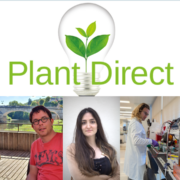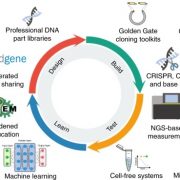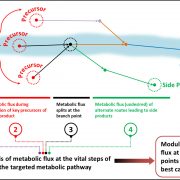Careers in Plant Synthetic Biology Part III: Using and Running a DNA Foundry
In part III of the blog series looking at future directions in Plant Synthetic Biology, I caught up with members of the Earlham DNA Foundry to find out about how anyone in research might benefit from a Foundry as well as careers in managing facilities and requirements for wet-lab positions.
A big thanks to them for their replies and hope you find them useful.
Earlham Foundry Members:
Directors: Nicola Patron, Anthony Hall Manager: Jose Carrasco-Lopez Automation Specialist: Adam Elliston.

Earlham Institute, Norwich, UK
What are the types of job titles someone might see advertised in a Foundry, and what level of expertise is required?
- Foundry Manager: PhD in the life sciences, post-doctoral experience in molecular biology, microbiology, genetics.
- Automation Specialist: PhD in the life sciences, experience in high-throughput experimentation and programming liquid-handling platforms.
- Technician: BSc in the life sciences, experience in molecular biology, microbiology, genetics. Ideally, some experience with highthoughput experimentation.
What does the role of a Foundry manager involve?
Foundry managers have a leadership role in managing the growth and sustainability of the Foundry. They spend time engaging and communicating with researchers in academia and industry to understand their scientific needs and establish new collaborations. They are also responsible for planning and costing projects and managing the time of other staff in the foundry. Another part of their job is technical — establishing and managing synthetic biology workflows, working with automation specialists and technical assistants to develop and execute protocols in DNA assembly, genetic engineering, micro-fermentation etc. Finally, the Foundry manager is also the lab-manager, taking care of service agreements and governing access to the equipment.
What do you look for in a Foundry manager?
A PhD and postdoctoral experience in molecular biology, microbiology or synthetic biology. Also essential are outstanding organizational, communication and interpersonal skills.
Can you suggest any ways students or postdocs may acquire the necessary skills or experience for work in a foundry?
Experience in molecular cloning, gene engineering, microbiology, liquid handling training, scripting experience.
What role do you envision for Foundries in academic research?
The UK BioFoundries were created to support UK’s research capacity in synthetic biology and to strengthen the bioeconomy. The Foundries are changing how scientists approach their research, in particular experiment design and scale. Our facilities can be accessed by academics either for specific services (e.g. assembly of batches constructs), for collaborative research projects (e.g. associating genotype to phenotype), to automate an existing laboratory workflow (e.g. enzyme assays), or for the creation of resources for research (e.g. knockout libraries). The Foundries also serve as a source of knowledge and training for automation, synthetic genomes, strain engineering etc.
What role do you envision for foundries in the plant science ecosystem?
Larger organisations, including those in the agri-biotech sector, would usually prefer to purchase their own automation platforms rather than to use public facilities. The main users of the Foundries are small-to-medium size businesses and academics who need to automate one or two workflows to perform a particular experiment. The public BioFoundries provide expertise and experience in automation as well as access to the equipment itself.
In what way can foundries be useful to anyone doing molecular biology in their work?
The Biofoundries are platforms for automated experimentation. While they are designed to enable scientists to perform large scale, complex experiments with multiple variables, the individual platforms can be used to automate many everyday workflows such as PCR-set up, bacterial transformation, colony picking, library preparation for sequencing, enzyme assays, microbial growth assays, DNA purification. Automation often allows miniaturisation of the reaction and therefore offers the potential to reduce the cost per reaction alongside increasing the number of reactions.










Leave a Reply
Want to join the discussion?Feel free to contribute!